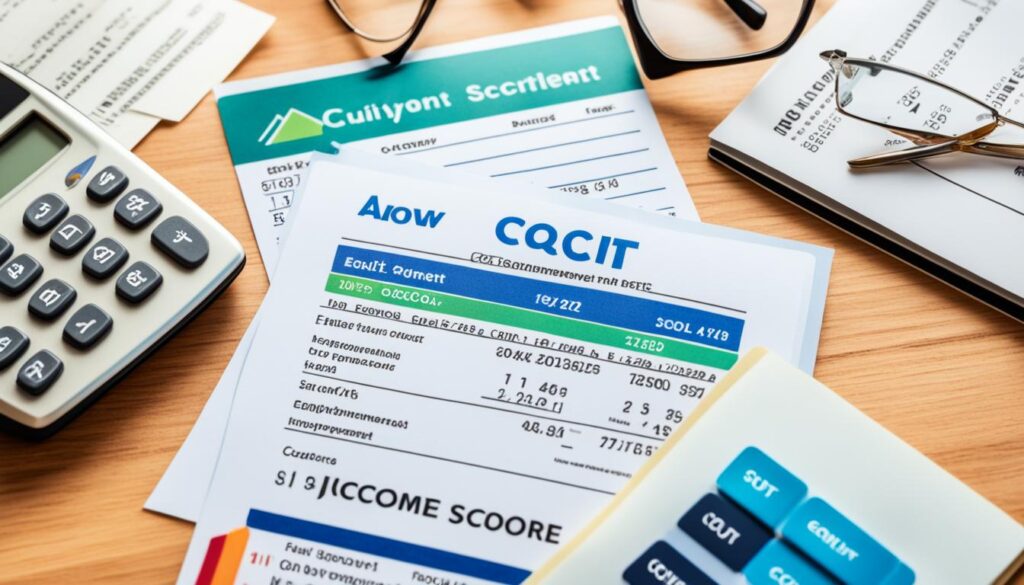A home equity loan lets homeowners borrow money using their home’s equity as collateral. Equity is the home’s value minus any mortgage amounts. These loans come with a fixed interest rate. This means the rate won’t change over the loan’s life. But, failing to repay can lead to losing the home through foreclosure.
Before getting a home equity loan, it’s smart to talk to a credit counselor. They can look at other options, especially for paying off debts. Homeowners should also check all the costs and fees. These extra charges add to the loan’s total amount due.
Key Takeaways:
- A home equity loan allows homeowners to borrow money based on the equity in their property.
- Equity is calculated by subtracting the existing mortgage from the current value of the property.
- Home equity loans typically have a fixed interest rate.
- It’s important to consider the risks and costs associated with a home equity loan.
- Consulting with a credit counselor can help explore alternatives and make an informed decision.
The Risks of Borrowing Against Your Home
Thinking of borrowing against your home for investment? It’s vital to be careful. Understand, no investment is totally safe. All have risks. So, look at all options closely and pick wisely.
Need help navigating home borrowing? Talking to a credit counselor can be smart. Find one from a reputable, non-profit group. They offer guidance on handling money and share insights on home borrowing risks.
Watch out for those asking for big fees upfront or promising too much. To find a trusted counselor, check with the National Foundation for Credit Counseling or your local Better Business Bureau. They can point you to reliable experts.
Remember, no easy ways or guarantees exist when borrowing against your home. Be careful, get expert advice, and carefully assess all dangers before deciding.
The Benefits of Non-Profit Credit Counseling Organizations
Non-profit credit counseling agencies help with finance and debt advice. They focus on helping people become more financially secure. This sets them apart from profit-driven companies.
- They personalize debt management to fit your unique financial situation.
- Non-profit agencies provide in-depth financial knowledge. This helps people grasp the risks of home borrowing.
- With certified counselors, they give advice without any bias. Your needs come first.
- Many non-profits offer their services for little or no cost. This makes help widely available.
Meeting with a non-profit credit counselor can shed light on home borrowing. This helps you make choices that match your financial dreams.

Using a Home Equity Loan for Home Improvement
A home equity loan is perfect for those needing funds for home improvements. It lets homeowners use their property’s equity to pay for upgrades. This loan gives you a lump sum of money for your project’s needs.
Using this loan wisely can help you grow your wealth. Improvements that boost your home’s value make your home nicer to live in. They also help when you sell, increasing your equity and possible profits.
But, not all upgrades are equal in adding value. Focus on projects like kitchen or bathroom makeovers. Also, adding more space or upgrading vital systems can draw in buyers. Such changes boost your home’s resale value greatly.
By pairing regular mortgage payments with key upgrades, you can see your equity spike. This approach, along with your home’s increasing value, could set you up for another loan down the line.
In conclusion, a home equity loan is an excellent way to finance your home improvement dreams. It allows you to increase both your living quality and your property’s value. Planning and smart spending are key to any successful home upgrade project.
Qualifying for a Home Equity Loan
To get a home equity loan, you need to have equity in your home. This means a portion of your home must already be paid for. In most cases, lenders need you to have at least 20% of your home paid off. They might even let you borrow up to 90% of your home’s value. Experienced homeowners who put down about 17% initially are often eligible for these loans. Yet, for new home buyers who put down less, they may face tighter restrictions.
Other important things for getting a home equity loan include your credit score, income history, and debt-to-income ratio. These all show if you can pay the loan back. If you don’t meet the required guidelines, you might not get approved.
Loan-to-Value Ratio
The loan-to-value (LTV) ratio is calculated by dividing your loan amount by your property’s appraised value. For instance, if you have an $80,000 loan and your property is valued at $100,000, your LTV is 80%.
Lenders like to see a lower LTV ratio because it means less risk for them. You can lower your LTV ratio by paying more of your home off and if your property’s value goes up.
Credit Score
Your credit score is also a big deal when it comes to getting this type of loan. It shows how good you’ve been with credit in the past. The higher your score, the better your chances of being approved for the loan.
Different lenders have different credit score standards. However, having a FICO score of 660 or more is usually a good target. A higher score can help you get better loan terms. If your score is lower, you might still get a loan, but it could cost you more in interest rates or have stricter conditions.
Income History and Debt-to-Income Ratio
Your income history and debt-to-income ratio (DTI) are also checked by lenders. They want to see that you have a steady job and enough income to cover your debt and the loan you’re applying for.
Most lenders prefer if your DTI is less than 43%. You also need to show documents like tax returns, pay stubs, and bank statements to prove your income stability.
Fulfilling the minimum criteria is not a guarantee. Lenders can still say no to your loan based on their own rules. Each lender might have specific things they look for to approve a loan.
| Eligibility Factors | Considerations |
|---|---|
| Equity in Your Home | Minimum 20% equity required, although up to 90% may be allowed |
| Down Payment | Experienced homeowners with around 17% down payment are often eligible |
| Credit Score | A higher credit score, preferably 660 or higher, improves eligibility |
| Income History | Stable income history demonstrates ability to repay loan |
| Debt-to-Income Ratio | DTI ratio below 43% is generally preferred by lenders |
Make sure you meet these criteria and have all the required documents ready. This boosts your chances of getting a home equity loan.

How a Home Equity Loan Works
A home equity loan lets homeowners borrow money using their home’s value as collateral. It’s good for big needs like home improvements, paying off debt, or buying a car. Here’s how it works in a nutshell:
Equity in Your Home
As you pay off your mortgage and your home’s value goes up, you gain equity. This equity is the difference between what your home is worth now and what you still owe. Banks see this as a guarantee when you ask for a loan based on your home’s equity.
Lump-Sum Payment
A home equity loan gives you all the money at once. It’s not like a credit line where you can keep borrowing up to a set limit. With a lump sum, you can better plan how to use your money.
Fixed Interest Rate
This loan type often comes with a fixed interest rate. A fixed rate stays the same for the whole repayment time, making your monthly payments steady. This lets you set a budget without worrying about changing rates.
Repayment Period
Home equity loans might be paid back over a set number of years, from 5 to 30. You’ll make monthly payments to cover what you borrowed and the interest. Longer repayment times mean lower monthly payments, but it also means more interest paid in the end.
Collateral and Foreclosure
Your home is the security for this loan. If you can’t pay, the bank can take your house. It’s smart to be sure you can manage the payments so you don’t lose your home.
A home equity loan can be a big help, offering a chunk of money, a stable interest rate, and a clear payment plan. But, be sure you can afford the payments before you sign up for one.

| Pros | Cons |
|---|---|
| Provides a lump sum of money upfront | Using your home as collateral poses a risk |
| Fixed interest rates provide stability and predictability | May have upfront fees and closing costs |
| Structured repayment plan | Longer repayment periods mean paying more interest over time |
| Potential tax advantages (consult a tax advisor) | Failure to make payments could result in foreclosure |
Comparison Between Home Equity Loans and HELOCs
When you look at borrowing against your home’s equity, you have two main choices: home equity loans and HELOCs. These let you use your equity to get credit, but they work differently. It’s good to know the key points.
Home Equity Loans
A home equity loan gives you a big sum of money to repay over time. You pay back in set amounts. The interest rate stays the same. You use your home to secure this kind of loan.
HELOCs (Home Equity Lines of Credit)
A HELOC is a line of credit you can use when you need money, for a period called the draw period. Usually, this period is 5 to 10 years. You can borrow and pay back multiple times. The rate changes, which might alter your monthly payments.
Both are useful, but knowing their differences is key. Consider:
- Credit Offered: Home equity loans give you a big chunk of cash. HELOCs let you draw out money as you need it.
- Interest Rate: Your interest rate will be fixed with a home equity loan, making your payments stable. But with a HELOC, the rate might go up and down.
- Secured Loan: Your home is the backup for both loans. Yet, a home equity loan is one payment while with a HELOC, you can borrow more over time.
Let’s check out a table for an easy comparison:
| Features | Home Equity Loans | HELOCs |
|---|---|---|
| Credit Offered | Single lump sum | Line of credit to draw from |
| Interest Rate | Fixed | Variable |
| Repayment | Fixed schedule | Draw and repayment periods |
| Flexibility | Fixed terms | Ongoing access to funds |
| Collateral | Home | Home |
Choosing between them relies on what you need financially. If it’s for a one-off like a home fix, consider a home equity loan. But, for ongoing needs, a HELOC might be better.
Always think about your finances and talk to a professional before deciding. Each has pluses and things to think about. Knowing these can guide you to the right option for you.

Popular Uses for Home Equity Loans
Home equity loans are a great way for homeowners to get funds for different needs. They’re quite flexible and are often chosen for various financial goals.
1. Home Remodel Projects
Many people use home equity loans to fund big home improvement projects. This includes upgrades to kitchens, adding more space, or making bathrooms better. Such loans allow you to boost your home’s value while living in the house of your dreams.
2. Debt Consolidation
If you’re dealing with several debts, a home equity loan may help. It lets you pay off various debts with one loan. This can lower your overall interest rate and simplify your monthly payments. But, it’s crucial to check if it fits well with your financial plan.
3. Large Expenses
Unexpected big bills or opportunities often require more money than your savings have. A home equity loan can fill this gap. Remember to think about how you’ll pay it back on time.
4. Higher Education
For those needing money for school, a home equity loan might be an option. This includes funding your education or that of a family member. Yet, make sure to look into other funding sources first like scholarships and student loans.
In short, home equity loans can assist with several financial needs. But, always consider your current financial health and future plans. It’s important to weigh the pros and cons before taking such a loan.
Obtaining a Home Equity Loan
Applying for a home equity loan is simple. It’s a way for homeowners to borrow money using what they’ve paid into their house. Here’s how you can get a home equity loan.
1. Completing the Application
To start, you fill out a form with loan details and some personal info. You’ll share about the money you make, your job history, and why you need the loan. This form can be found online or given to you by the lender.
2. Estimating Your Home’s Value
Lenders need to know how much your home is worth. This helps them figure how much they can lend you. They might look at recent sales in your area or send a person to appraise your house.
3. Consideration of Credit Score and Financial History
Your credit score and financial background really matter. They affect if you’ll get the loan and what its terms will be. Having a high credit score and solid financial history means lenders might offer better deals.
4. Loan Estimate and Terms
After looking at your application, lenders will give you an idea of the loan’s terms. This includes the interest rate and what your monthly payments would look like. They’ll also show you the extra costs when you get the loan, like closing costs.
5. Submission of Supporting Documents
Before your loan is fully approved, you’ll need to submit several documents. These could include pay stubs, tax returns, and bank statements. Getting these in quickly can speed up the loan process.
6. Closing and Disbursement
When everything is set, there’s a closing meeting you have to attend. This is where you sign off on the loan and its details. After that, you’ll get the money, either all at once or in parts, just like you agreed with the lender.
Closing costs are part of getting a home equity loan. They cover things like appraisals, checks on your credit, and the legal paperwork. But, some loans don’t charge you these costs.
Getting a home equity loan means thinking about your money matters. By knowing the steps and showing the right documents, you can get the money you need. This helps you reach your financial goals.
Qualifying Factors for a Home Equity Loan
To get a home equity loan, you must meet specific standards. These standards cover your credit score, the equity in your home, your income track record, and a loan-to-value ratio.
Credit Score
A solid credit score is key to getting a home equity loan. Lenders seek a score of 660 or above, showing good money management. A higher score means you’re a great candidate for a loan.
Equity in Your Home
How much of your home you own matters a lot. It’s the difference between your home’s market value and the mortgage you owe. You usually need at least 20% equity to qualify. The more you have, the better your chances are.
Income History
Your earning history shows if you can pay back a loan. Lenders look at your job situation, how long you’ve been working, and if your income is reliable. A stable, ongoing income history boosts your loan qualification.
Loan-to-Value Ratio
The loan amount you want versus your home’s value is the LTV ratio. Lower ratios are better for lenders. Most prefer it to be 80% or lower.
Lenders may have slightly different rules for home equity loans. But, aiming for a high credit score, plenty of equity in your home, a steady income, and a good loan-to-value ratio helps you qualify.
| Qualifying Factors | Potential Impact |
|---|---|
| Credit Score | A higher credit score increases eligibility and may result in favorable loan terms. |
| Equity in Your Home | A higher amount of equity improves the chances of approval and may lead to a larger loan amount. |
| Income History | A stable and sufficient income history demonstrates your ability to repay the loan, making you a more attractive borrower. |
| Loan-to-Value Ratio | A lower LTV ratio reduces the risk to the lender and increases the likelihood of approval. |
Conclusion
Home equity loans offer a way for homeowners to access funds through their home’s equity. But, borrowers need to be mindful of the risks. They should also think carefully about how they plan to invest the money.
Owners should first check if they meet the loan’s criteria. This includes looking at their credit score, the home’s equity, and income history. The application process will likely need some paperwork and a loan estimate.
It’s wise for homeowners to carefully consider the risks and rewards. and review all the necessary qualifications. They should do this before deciding on a home equity loan. Talking to financial experts and looking at other options is also smart.
FAQ
What is a home equity loan?
A home equity loan lets homeowners borrow money based on their property’s equity. Equity comes from subtracting the mortgage from the home’s value.
What are the risks of borrowing against your home?
It’s risky to borrow against your home. Treat it with care, especially as part of an investment. Remember all investments carry risks. It’s wise to get advice from a credit counselor, preferably from a non-profit.
Can a home equity loan be used for home improvement?
Yes, people often use home equity loans to improve their homes. You can use the loan for many things. But, it’s best to choose projects that add value to your home.
How can I qualify for a home equity loan?
You generally need at least 20% equity to qualify. Some lenders will let you borrow up to 90% of your home’s value. They also check your credit, income, and how much debt you have.
How does a home equity loan work?
This loan lets you borrow a specific amount based on your home’s equity. You pay it back over an agreed time, with a set interest rate. Your home is used as a guarantee.
What is the difference between a home equity loan and a HELOC?
Home equity loans give you a lump sum at a fixed interest rate. HELOCs work like a credit card, where you get funds as needed, with a changing interest rate. Both use your home as security.
What are some popular uses for home equity loans?
People often use these loans for home improvements or to consolidate debt. They can also help cover big expenses or pay for education costs.
How do I obtain a home equity loan?
To get a home equity loan, you’ll fill out an application with your loan and personal details. Lenders look at your home’s value, your credit, income, and debts. You might need to provide supporting documents.
What are the qualifying factors for a home equity loan?
You usually need a credit score of 660 or more to qualify. Lenders also check your equity, debt, and income. A better credit score and more home equity can improve your chances.
What should I consider before getting a home equity loan?
It’s important to know the risks and plan carefully before borrowing. Check that you meet the loan requirements, including your credit and home equity. You’ll also need to prepare some documents for your application.


















